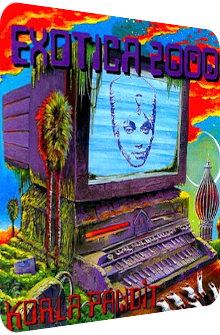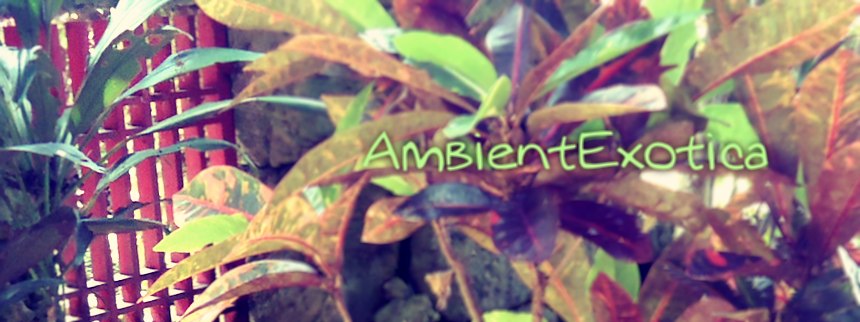
Korla Pandit
Exotica 2000
1996
Exotica 2000 is the legacy of John Roland Redd (1921–1998) aka Korla Pandit, the mysterious child prodigy from the East who traveled to North America in order to enchant the public with his skills on the pipe organ and as a hypnotist. The story has been told several times all over the web and at AmbientExotica as well: of course, it was all a good-natured ploy that even led to a short-lived sequence of TV appearances and his own show. Korla Pandit’s vintage albums such as Tropical Magic, Latin Holiday (both 1959) or Hypnotique (1960) are the finest organ-fueled and piano-accompanied bachelor pad artifacts of the Exotica genre. Benignancy and creepiness go hand in hand together, stadium organ anthems are followed by carnivalesque fairground ditties and nocturnal interpretations of Jazz standards. To be honest, Redd’s music has not aged well at all and is a bold counterpoint to the vivacious wealth of instruments, birdcalls and patterns of any Exotica quartet or string orchestra of your choice.
Korla Pandit, notwithstanding these limits, remains a curiously remarkable luminary of the genre. He is right in the center of Exotica and definitely not just a mere sidenote. The surprise level therefore could have been enormous when Exotica 2000 is announced and released in 1996 on the Olympia, Washington-based Sympathy For The Record Industry label, thus ending a twenty-year hiatus of Redd’s career. In hindsight, the artist missed the sweetspot though. 1997 saw the real revival of Exotica thanks to bands like Don Tiki, Euroboys and Tipsy, the latter of whom released their debut Trip Tease in 1996 already, but which gained real traction in 1997. No matter the historical dimensions, the 74-year-old faux-hypnotist delivers a potpourri of nine tracks on Exotica 2000 that draws from his own classics and interpretations of well-known vintage gold standards. Everything seems to work in favor of John Roland Redd, but unfortunately, the album is a lackluster effort.
With a runtime of only 24 minutes, it is way too short even by Exotica standards, and while I embrace similarly short Exotica works, it so happens in this case that shortness clashes with minimalism. The pipe organ and electronic rhythm devices are the sole ingredients, only the outro features Korla Pandit on the piano. The otherworldly shtick of Korla Pandit has grown outdated in the 90’s, and you hear it in every note. Occasionally, however, the old genius shimmers through the jejune wastelands, and in addition to this, I have to admit that the textural range of the pipe organ can still keep up with the shapeshifting timbre of a good steel guitar. So all is not lost in Korla Pandit’s final farewell.
Aaah, the good old times. Whether this interjection is a sigh of relief or a malevolent scream of pain is up to the listener to decide, for you cannot enforce the feeling of nostalgia. Rest assured that the opener The Magnetic Theme is a faux-Oriental critter with dark undertones and a more solemn majesty whose implied grandeur is horribly out of place in 1996. That said, it would not succeed in any decade. The punch or oomph of the pipe organ may be great, the digitally processed hazy pedal sound very eerie and reminiscent to brutish footsteps in the dark, but there is no warmth in this piece until the very end when the stage hypnotist finally unleashes melodramatic yet glowing chords. The following The Way You Look Tonight, originally envisioned by Dorothy Fields and Jerôme Kern is bachelor pad craziness par excellence. While the glitchy burps of the pedal remind of bit-crushed computer sounds, the rocking organ blebs – or are they stabs? – are highly melodious, their sustain phase delicately long and brightness all over this arrangement. Naturally, Korla Pandit’s take is gimmicky and out of touch, but these are seals of quality, right?
Up next is the organ maestro’s own Trance Dance, a faux Middle Eastern caravan of arcanely vesiculating vaulted metronoms and stardust-coated crystalline chords which reciprocate between sanguine amicability and a blazing pompousness of the paradoxically whimsical cinematic kind. The short infusion of grandiloquence harkens back to the well-known technique of dramatizing or augmenting a segue via rising tones. If these are then based on tercets or chords, their vigor triples. These tricks do not help Trance Dance, it remains a peculiar creepscape that only unfolds its magic at the very end of October. Otto Harbach’s and Jerôme Kern’s Smoke Gets in Your Eyes, however, takes the cake. Already retrogressive itself, Korla Pandit adds another layer of distance and yore to the melody. The organ washes are saturated and feisty, therefore very warm. It is the dissonant chords that sneak into the performance that create the distance, simulating an ecclesial setting that the youth of the 90’s could have mistaken as a church anthem. The rather rapid-firing organ shards are a tad too swinging for being used in cathedral settings, but again, shameful hilarity ensues nonetheless.
I am not kidding when I state my delight in having Tales Of The Underwater Worshippers featured on this little album. It is classic material written by Korla Pandit himself. The runtime of six minutes of its original incarnation off Music Of The Exotic East (1958) is mercilessly reduced on the ’96 version and lacks the truthfully profound cinematic arc, but otherwise retains the darkness and aquatic mystique. However, this version also shows the – already blatantly obvious – rush of the production-related aspects. Considering the impressive timespan of nearly four decades that lies between these versions, it is factually the stylistic gap between both versions that is even larger! The new take lacks soul and devotion, it is, as I see it, not enough to simply play a few chords of the great original. When Mr. Redd spoils the material of other songwriters, the organ textures can be blamed for this; the replacement of strings, reeds or horns with one single organ leaves a strange aftertaste. Fair enough. But when the artist reinterprets himself, a meticulous look is justified, and Tales Of The Underwater Worshippers simply lacks the pizzazz and esprit of the beloved original. Probably the boldest misstep of Korla Pandit’s final album.
While Alberto Dominguez‘s and Milton Leeds’ Perfidia is performed in a Rock-oriented manner where, for the first and only time, the crunchy pedal/metronom percussion scheme outshines the ashen organ arabesques due to its scatman-like stumbling beat structure and general omnipresence, Nacio Herb Brown’s and Arthur Freed’s Temptation sees the same beat texture slowed down and glued to a surprisingly effective graveyard atmosphere as the organs somehow orientalize the Latin-inspired melody. This is a tune where the old genius of John Roland Redd awakes for a short time. Pelone, Telefone then is a breakbeat-inspired original cut that launches with a maelstrom of alatoric chord sequences that would have made Keyboard Cat proud. The unnerving staccato structure comprises iridescent, sanguine-tinted as well as bucolic splinters. A largely useless inclusion. The final track is a live performance of the Greek Folk dance Misirlou. And the crowd is up for it, cheering lustfully when Pandit plays the classic piano and then switches over to the organ. The digital rhythm sounds particularly clonky and acidic, but you know, the melody of Misirlou is glowing eternally and forever more, and so the entertainer cannot do anything particularly wrong in his comparably long performance of over five minutes.
The Exotica genre embodied an enormously tiny niche in the music market of 1996. It is all the more appreciable that Korla Pandit revisits his former glory (formula glory?) after a hiatus of 20 years in a time when the Neo-Exotica revival was only in its infancy stage, if at all. Exotica 2000, similar to the Kokee Band’s Exotica 1970 (1966), serves as a foreshadowing device, a possible retro future full of revivals and reminiscences of the old stars. In this regard, Korla Pandit’s poetic vision has become reality, thank the tiki gods. Alas, Redd died in 1998 and could not experience the full force of the genre’s resurrection unlike, say, Martin Denny who gave many post-millennial interviews about the newly gained interest in Exotica music and even appeared on two songs off Don Tiki’s The Forbidden Sounds Of Don Tiki (1997) which is released only a few months after Exotica 2000.
So the time is right for Korla Pandit to return to the scene. Unfortunately, this extrinsic factor does not help his music which is enormously antediluvian and oldfashioned. His shtick has not aged well at all, and the same texture base on all presented instrumentals is the achilles heel in the cool 90’s and their overabundance of computer games, synthesizer luminaries and action movies. The attention span of the public decreased; while the music cannot be blamed for this, it is harder for Redd to gain traction. I really try to find good things in every Exotica release, no matter how chintzy or obscure it is, but the tristesse of Exotica 2000 shows me the limits of my horizon. There are short moments of euphony and dissonance that are both great and devoid of any trend, but these are by far not enough to make this a great return to form. Korla Pandit’s music is based on minimalism and the breaking of boundaries in-between this self-imposed walled garden of reduction. Exotica 2000, alas, is simply too bland and weird an album to be truly considered by any genre connoisseur.
Exotica Review 301: Korla Pandit – Exotica 2000 (1996). Originally published on Jan. 4, 2014 at AmbientExotica.com.
